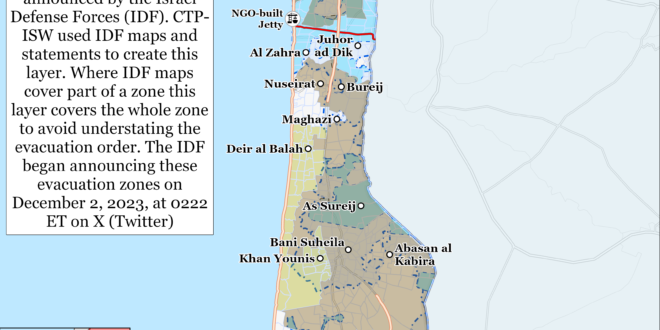CTP-ISW continues to assess that an Iranian drone and missile strike targeting Israel is the most likely Iranian course of action. The Pentagon spokesperson reported on August 26 that the United States assesses there is still a threat of strikes against Israel from Iran or its Axis of Resistance based on comments from Iranian leaders and “others.”[i] Iranian Armed Forces General Staff Chief Maj. Gen. Mohammad Bagheri said on August 26 during a ceremony for the new Iranian Minister of Defense Brigadier General Aziz Nasir Zadeh that Iran and the Axis of Resistance will retaliate against Israel “separately and independently.”[ii] Bagheri gave this statement at a ceremony that included in its audience a large number of top Iranian commanders who would be responsible for deciding and implementing an Iranian response.[iii] Iranian Foreign Minister Abbas Araghchi restated Iran’s right to respond for the death of Haniyah and warned that Iran’s response will be “definitive, accurate, and calculated” during phone calls with his foreign counterparts on August 23 and 26.[iv]
Iran will likely take lessons from Hezbollah’s attack to tailor its own retaliatory strike to fulfill Iranian objectives. CTP-ISW argued on August 25 that Iran and its Axis of Resistance could use Hezbollah’s attack in part as a reconnaissance-in-force to increase the efficacy of future attacks on Israel.[v] The US military defines reconnaissance-in-force as “a deliberate combat operation designed to discover or test the enemy’s strength, dispositions, and reactions or to obtain other information.”[vi] CTP-ISW previously noted that Iranian leaders are likely incentivized to slowly assemble a strike package that both hurts Israel and avoids escalation into a wider war.[vii] Iran could use Hezbollah’s August 24 strike to identify weaknesses in Israel’s air defenses and monitor Israel’s reaction to understand it’s redlines and willingness to retaliate.
The IDF assessed that Hezbollah launched less than 50 percent of the number of munitions it intended to launch during its August 24-25 attack on Israel. State-funded, IDF-supported Israeli Army Radio reported on August 26 that the IDF assessed that Hezbollah planned to launch 500 to 600 rockets at northern Israel and “dozens” of drones targeting central Israel in its attack.[viii] Hezbollah actually fired 200 to 300 projectiles, including approximately 20 one-way attack drones, into Israel during the attack.[ix] The IDF added that Hezbollah launched 90 percent of the rockets and drones used in its August 24-25 attack from civilian areas in Lebanon.[x] The IDF intercepted many of the approximately 20 Hezbollah drones before they reached their intended targets.[xi] Some of the 20 drones fell before reaching their target, and none of the roughly 20 drones reached their targets. The IDF assessed that Hezbollah did not try to launch precision missiles during this attack but noted that Hezbollah retains the capability to do so.[xii] Israeli Army Radio reported that Hezbollah considered firing precision missiles at the IDF Glilot Base in central Israel but decided against such a strike due to fear of a strong Israeli reaction.[xiii] Hezbollah Secretary General Hassan Nasrallah indicated that the August 24-25 attack was satisfactory and said that the response to senior Hezbollah commander Fuad Shukr’s death is ”over.”[xiv]
Iran is discussing ongoing Gaza ceasefire negotiations with international mediators. Iranian President Masoud Pezeshkian and Iranian Foreign Affairs Minister Abbas Araghchi separately met with Qatari Prime Minister and Foreign Minister Mohammad al Thani in Tehran on August 26. [xv]Araghchi stated that Iran will support any agreement accepted by Hamas.[xvi] Pezeshkian expressed gratitude to Qatar for its mediation efforts and stated that Muslim countries must take ”joint action” to curb Israel.[xvii] Araghchi separately thanked Egyptian Foreign Affairs Minister Badr Abdelatty for Egypt’s mediation efforts in a phone call on August 23.[xviii]
Hamas launched a single rocket targeting Tel Aviv on August 25 from northern al Qarara, Khan Younis.[xix] The IDF was operating in al Qarara, possibly indicating that Hamas was faced with a decision to use its remaining rocket or lose it to Israeli ground operations. The IDF detected a single rocket that fell in an open area in Rishon LeZion in the Tel Aviv metropolitan area.[xx] 98th Division forces identified Hamas’ launch site and directed an airstrike targeting the launcher and other militia infrastructure near the al Qarara Secondary School in northern al Qarara.[xxi] The IDF said that secondary explosions from the airstrike indicated that there were additional rockets inside the launcher.[xxii] Hamas has maintained the strategy throughout the war of ”emptying” its rocket stockpiles as the IDF advances into an area.[xxiii] Israeli ground forces were already operating in the vicinity of the rocket launcher.[xxiv] Hamas engaged Israeli forces in al Qarara on August 26 and the 98th Division has been conducting operations in the area since at least August 18.[xxv] Hamas retains a very limited ability to continue rocket attacks targeting major Israeli population centers such as Tel Aviv as a result of current IDF operations.
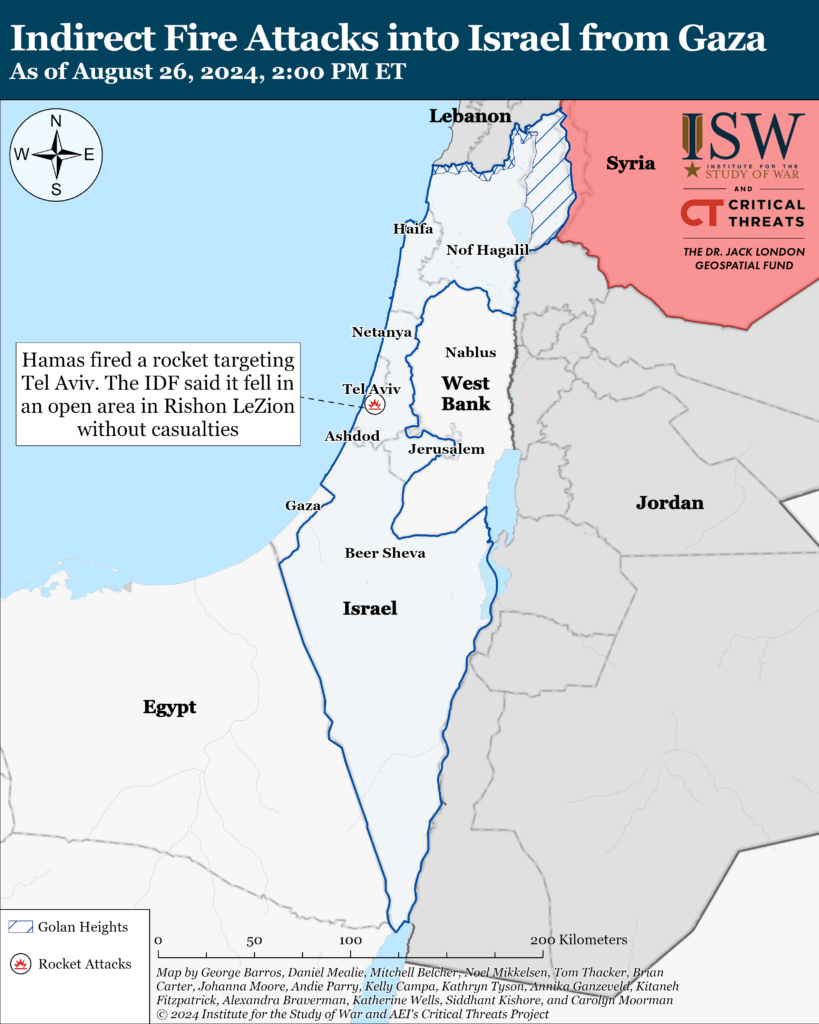
Recorded reports of attacks; CTP-ISW cannot independently verify impact.
Key Takeaways:
- Iranian Retaliation: CTP-ISW continues to assess that an Iranian drone and missile strike targeting Israel is the most likely Iranian course of action. Iranian Armed Forces General Staff Chief Maj. Gen. Mohammad Bagheri said on August 26 during a ceremony for the new Iranian Minister of Defense Brigadier General Aziz Nasir Zadeh that Iran and the Axis of Resistance will retaliate against Israel “separately and independently.” Iran will likely take lessons from Hezbollah’s attack to tailor its own retaliatory strike to fulfill Iranian objectives.
- August 24-25 Hezbollah Attack on Israel: The IDF assessed that Hezbollah launched less than 50 percent of the number of munitions it intended to launch during its August 24-25 attack on Israel.
- Iran: Iran is engaging with international mediators in the most recent round of ceasefire-hostage negotiations.
- Gaza Strip: Hamas launched a single rocket targeting Tel Aviv on August 25 from northern al Qarara, Khan Younis. The IDF was operating in al Qarara, possibly indicating that Hamas was faced with a decision to use its remaining rocket or lose it to Israeli ground operations.
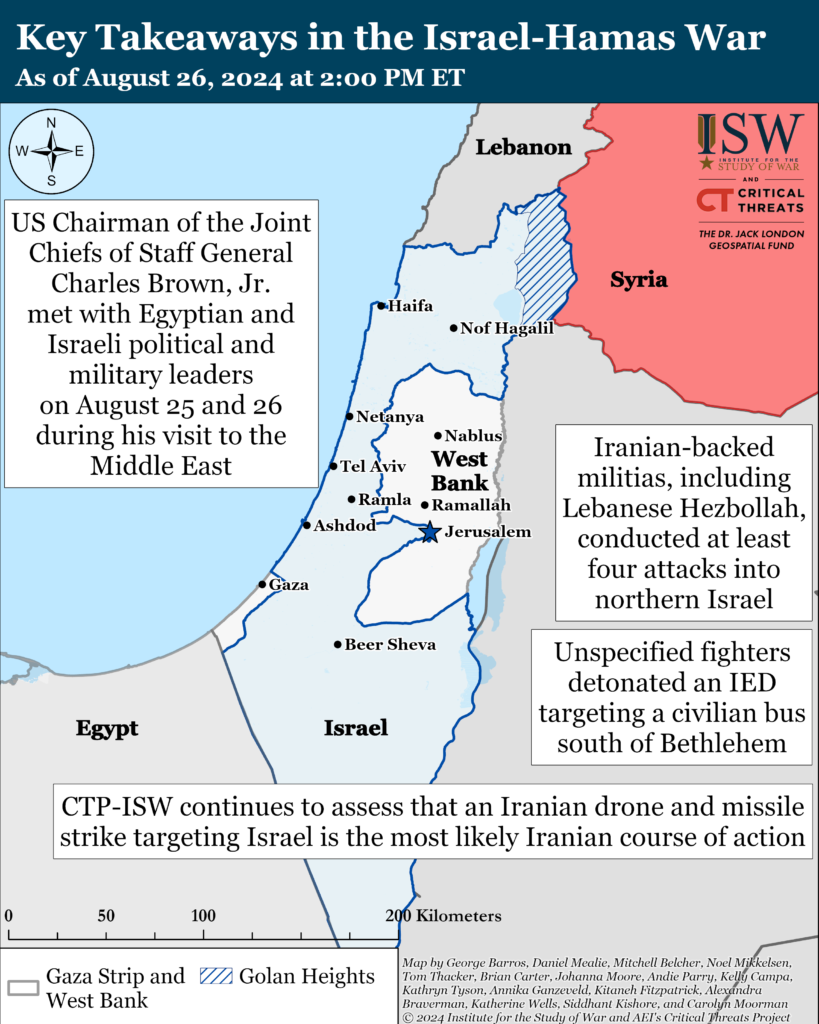
Gaza Strip
Axis of Resistance objectives:
Erode the will of the Israeli political establishment and public to sustain clearing operations in the Gaza Strip
Reestablish Hamas as the governing authority in the Gaza Strip
The IDF 252nd Division continued to operate around the Netzarim Corridor on August 26.[xxvi] Israeli forces destroyed militia infrastructure, killed fighters, and located underground infrastructure and weapons around the corridor.[xxvii] Israeli tanks fired at militia cells that threatened Israeli forces.[xxviii] Two Palestinian militias fired rockets targeting Israeli forces near the corridor.[xxix]
The IDF 98th Division has continued clearing operations in Khan Younis and on the outskirts of Deir al Balah since August 25.[xxx] Israeli forces killed dozens of Palestinian fighters and located weapons in the area.[xxxi] Israeli forces directed a drone strike against a Palestinian fighter who fired anti-tank guided missiles at Israeli forces.[xxxii] Hamas conducted several attacks targeting Israeli forces operating in al Qarara, northeast of Khan Younis.[xxxiii] Hamas fighters fired thermobaric rockets and rocket-propelled grenades (RPG) targeting Israeli forces positioned in a house.[xxxiv] Hamas fighters also detonated a pre-rigged tunnel after observing Israeli forces approaching the entrance and claimed that the attack killed and wounded Israeli soldiers.[xxxv] Palestinian sources reported that IDF armor advanced into al Mahta and al Katiba in central Khan Younis on August 26.[xxxvi]
The IDF 7th Brigade and 35th Paratroopers Brigade (98th Division) continued to operate on the outskirts of Deir al Balah on August 26.[xxxvii] Israeli forces have killed dozens of Palestinian fighters and conducted airstrikes on over 100 militias targets in the past two weeks of operations in the area.[xxxviii] The IDF 35th Paratroopers Brigade searched and destroyed militia compounds in the area.[xxxix] Israeli forces located numerous weapons, including magazines, anti-tank guided missiles, tactical vests, and knives in one apartment in the area.[xl] The IDF 603rd Combat Engineering Battalion and Yahalom combat engineers located and destroyed a 700-meter-long Hamas tunnel in al Maani, southeast of Deir al Balah.[xli]
Palestinian sources reported on August 25 that Israeli forces operated near al Musaddar, east of Deir al Balah, suggesting that Israeli forces have continued to advance north towards Deir al Balah.[xlii] The IDF issued evacuation orders for al Musaddar on August 24.[xliii] A Palestinian journalist reported that IDF armor was present in areas south and east of al Musaddar on August 26.[xliv] The Popular Front for the Liberation of Palestine (PFLP) fired mortars and rockets targeting Israeli forces in al Musaddar.[xlv] CTP-ISW has previously reported the IDF has advanced north towards Deir al Balah from northeast Khan Younis since August 17.[xlvi]
Al Musaddar is immediately east of a section of al Mawasi humanitarian zone in Deir al Balah that the IDF ordered evacuations in on August 25.[xlvii] The IDF said that area would become a ”dangerous combat zone.”[xlviii] Western media reported on August 26 that the IDF‘s evacuation orders led many Palestinians to flee al Aqsa Hospital, Deir al Balah’s main medical facility, which is located less than a thousand meters from the IDF’s designated evacuation zone.[xlix] Médecins Sans Frontières said in a statement on X (Twitter) on August 26 that it may suspend its medical care in Al Aqsa Hospital for the time being after an explosion occurred 250 meters from the hospital.[l]
The IDF 162nd Division continued clearing operations in Tal al Sultan, Rafah, on August 26.[li] Israeli forces killed dozens of Palestinian fighters, destroyed militia infrastructure, and located large quantities of weapons in the neighborhood.[lii]
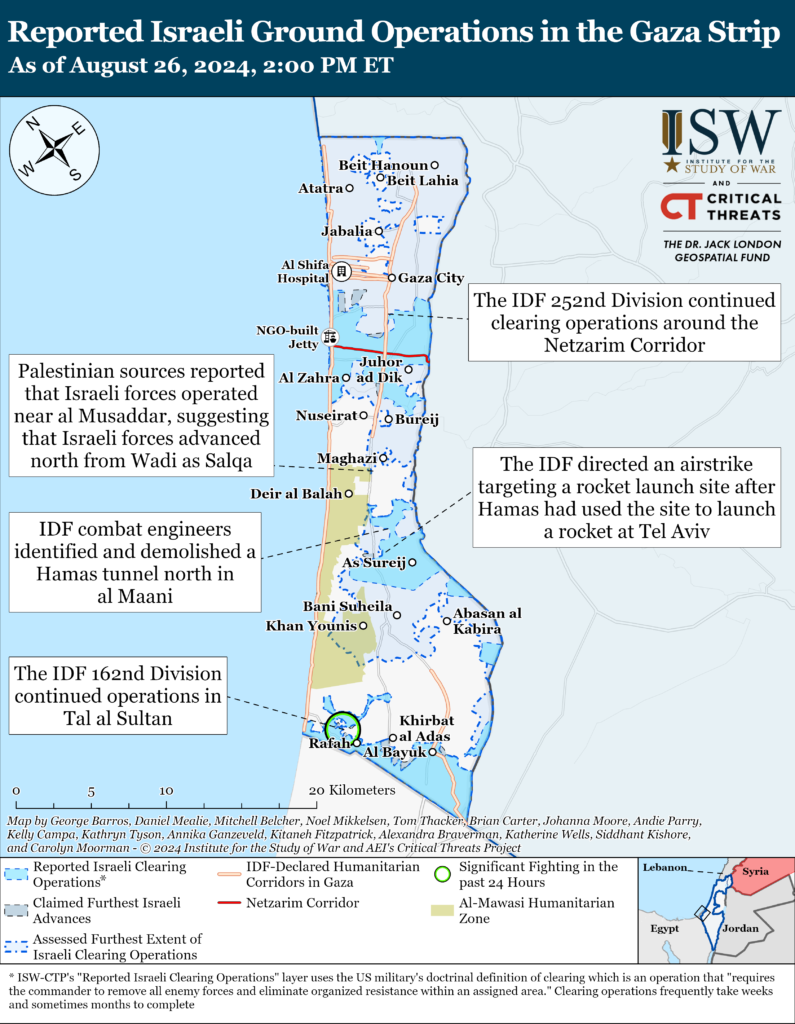
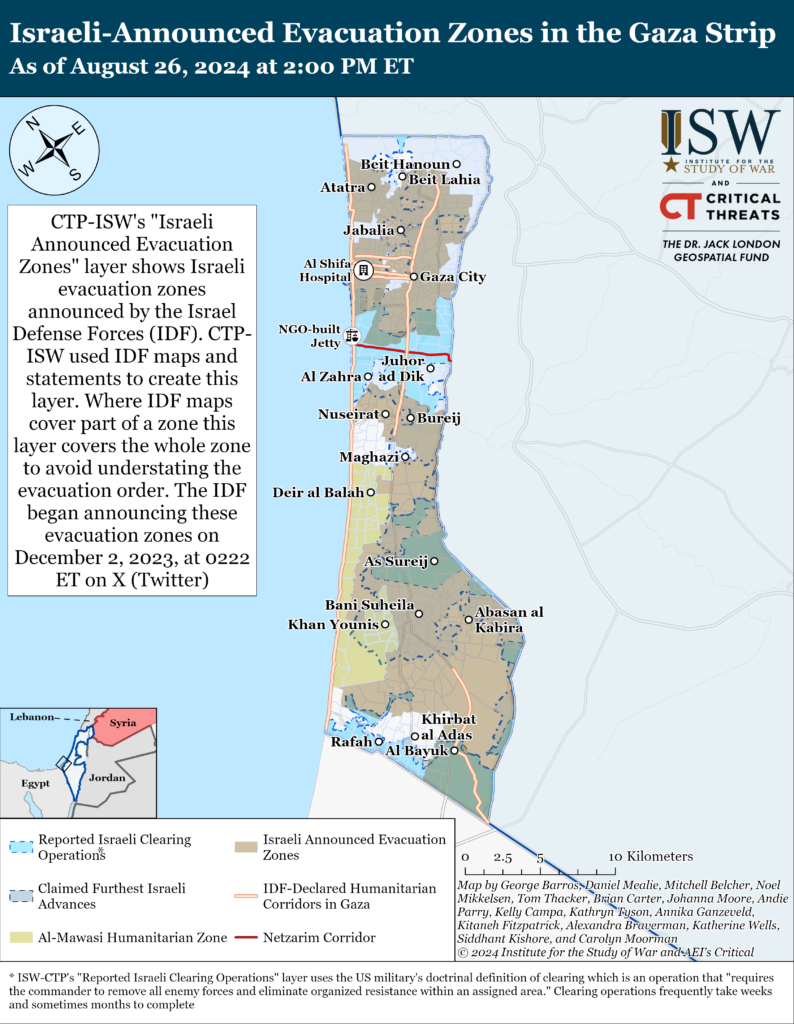
United Nations aid groups said that intensifying conflict, the breakdown of law and order, limited border crossings, and damaged infrastructure severely limited their ability to deliver food aid to the Gaza Strip in July and August.[liii] The UN World Food Program said in an August 26 statement that it was only able to deliver half of the 24,000 tons of food aid required for aid operations in July and August.[liv] The World Food Program cited roads damaged by shell craters and debris and limited border crossings as a reason for the lack of necessary aid.[lv] UNRWA said that a breakdown of law and order and repeated evacuation orders have similarly likely kept “more than one million people“ from receiving food rations[lvi] CTP-ISW previously reported that the breakdown of Hamas governance across the Gaza Strip has enabled the robbery and looting of humanitarian aid across the Gaza Strip.[lvii]
US Chairman of the Joint Chiefs of Staff General Charles Brown Jr. met with Egyptian and Israeli political and military leaders on August 25 and 26 during his visit to the Middle East. General Brown met with Egyptian President Fattah al Sisi and Minister of Defense General Abd al Majid Ahmad Saqr in al Alamein, Egypt, and with Egyptian Armed Forces Chief of Staff Lieutenant General Ahmad Khalifa in Cairo on August 25.[lviii] Brown discussed ongoing tensions in the region and the prevention regional escalation with the Egyptian leaders.[lix] Brown traveled to Israel and met with Israeli Defense Minister Yoav Gallant, IDF Chief of Staff Lieutenant General Herzi Halevi, and other IDF commanders in Tel Aviv on August 26.[lx] General Brown affirmed the US-Israeli strategic partnership and discussed the Israeli preemptive strike on Hezbollah and Hezbollah’s subsequent attack on August 24 and 25. General Brown also visited the Northern Command headquarters in Safed, Israel, with Halevi on August 26.[lxi]
US Secretary of Defense Lloyd Austin spoke with Israeli Defense Minister Yoav Gallant on August 25 to discuss Israel’s pre-emptive strikes against Hezbollah.[lxii] Austin reaffirmed Israel’s right to self-defense and US support for Israel’s security amid threats from Iran and Iranian-backed groups in the region.[lxiii] Austin instructed the USS Theodore Roosevelt and USS Abraham Lincoln carrier strike groups to remain in the region for an unspecified period of time.[lxiv]
West Bank
Axis of Resistance objectives:
Establish the West Bank as a viable front against Israel
Israeli forces have engaged Palestinian fighters in at least five locations in the West Bank since CTP-ISW’s last data cutoff on August 25.[lxv] The al Aqsa Martyrs’ Brigades fired small arms targeting Israeli forces at a military checkpoint south of Tulkarm.[lxvi] The al Aqsa Martyrs’ Brigades separately fired small arms at Israeli forces near the Ajaj Mosque in Nablus.[lxvii]
Unspecified fighters detonated an improvised explosive device (IED) targeting a civilian bus south of Bethlehem on August 25.[lxviii] The IDF said that the attack in the Marach Rabah village did not cause any casualties. Israeli Army Radio published a picture showing minimal damage to the bus, suggesting the attackers planned the attack poorly or used a rudimentary IED.[lxix] The IDF set up roadblocks in the area and it is searching for suspects involved in the attack.[lxx]
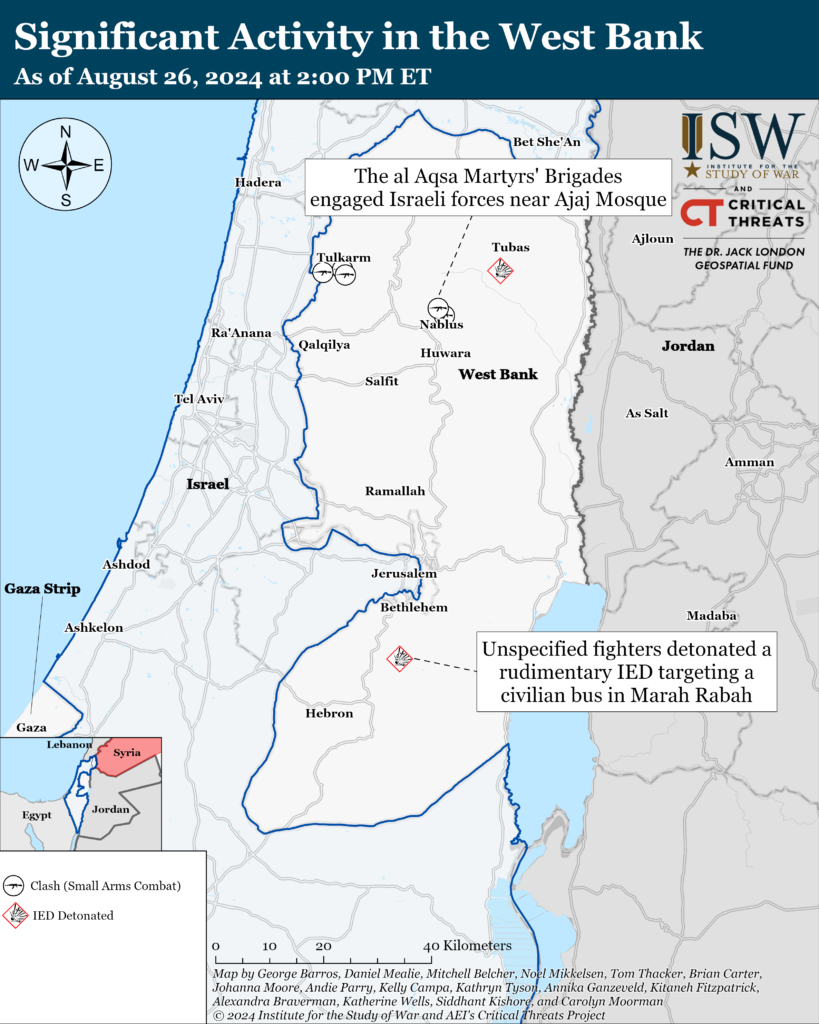
This map is not an exhaustive depiction of clashes and demonstrations in the West Bank.
Southern Lebanon and Golan Heights
Axis of Resistance objectives:
Deter Israel from conducting a ground operation into Lebanon
Prepare for an expanded and protracted conflict with Israel in the near term
Expel the United States from Syria
Iranian-backed militias, including Lebanese Hezbollah, have conducted at least four attacks into northern Israel since CTP-ISW’s last data cutoff on August 25.[lxxi]
Lebanese media reported that the IDF Air Force (IAF) conducted a drone strike targeting a Hamas member in Sidon, southern Lebanon, on August 26.[lxxii] Lebanese media reported that the strike targeted Hamas official Nidal Hlehill in his vehicle near Abra, east of Sidon.[lxxiii] The drone reportedly injured Hlehill but did not kill anyone.[lxxiv]
IDF Home Front Command commander Major General Rafi Milo met with representatives of northern Israel’s school systems and officials from the Israeli Education Ministry on August 25 to prepare for the upcoming school year.[lxxv] Milo discussed security preparations for the start of the school year in northern Israel. Israeli Education Minister Yoav Kisch said in July 2024 that students in northern Israel would begin school remotely on September 1, and indefinitely postponed an in-person start date.[lxxvi] Milo emphasized the importance of strengthening security and defense to “create an optimal security [environment] that will allow the children of northern residents to open the school year.”
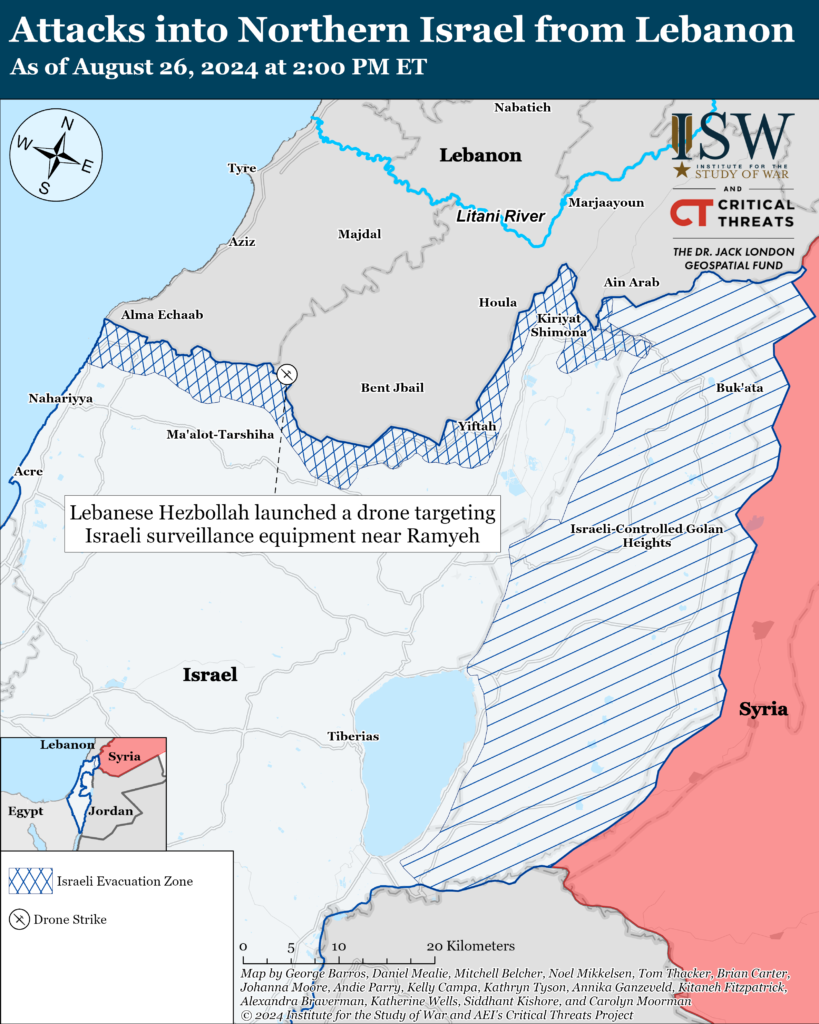
Iran and Axis of Resistance
An Iraqi source close to the Islamic Resistance in Iraq factions reported to Lebanese-outlet al Akhbar that the Iraqi Resistance Coordination Committee met to establish a unified position regarding attacks targeting US forces.[lxxvii] The source claimed that ”most” leaders in attendance agreed that the pause in attacks targeting US forces must end. The committee discussed ways to ”work against” the United States, including increasing the rate of attacks targeting US forces. Iranian-backed Iraqi militias have only conducted seven attacks targeting US forces since July 17, none of which have been claimed by the Islamic Resistance in Iraq.[lxxviii]
Iranian-backed Iraqi militia Kataib Sarkhat al Quds, formerly known as Ashab al Kahf, announced that it had resumed its military operations targeting Israel after the six-day pause it had announced for the Arbaeen Pilgrimage.[lxxix] Kataib Sarkhat al Quds has previously stated its affiliation with the Islamic Resistance in Iraq—a coordinating body for Iranian-backed Iraqi militias—that has conducted multiple recent drone attacks targeting Israel. [lxxx]
Popular Mobilization Forces (PMF) forces deployed forces to Gulajo, Diyala Province, Iraq, after reports of ISIS activity in the area.[lxxxi] Gulajo is in a disputed area between the Iraqi Federal Government and Kurdistan Regional Government.[lxxxii] ISIS exploits a lack of coordination between Iraqi Security Forces, including the Popular Mobilization Forces, and the Kurdish Peshmerga within the disputed internal boundaries between Iraq and the Iraqi Kurdistan Region.[lxxxiii] Iraqi media reporting did not make clear the exact size of the PMF formation that entered Gulajo, but the formation withdrew from the area after a couple of hours.[lxxxiv] 5th Peshmerga Brigade Commander Brigadier General Kawa Gharib told an Iraqi outlet that the 16th Peshmerga Brigade is deploying to the area to fill a gap between 5th and 9th Peshmerga Brigades.[lxxxv]
Unspecified Iranian-backed militias launched a drone from Syria into the Golan Heights on August 26.[lxxxvi] The IDF intercepted the drone near Hamat Gedar, on the Jordanian border in the southern Golan Heights.[lxxxvii]
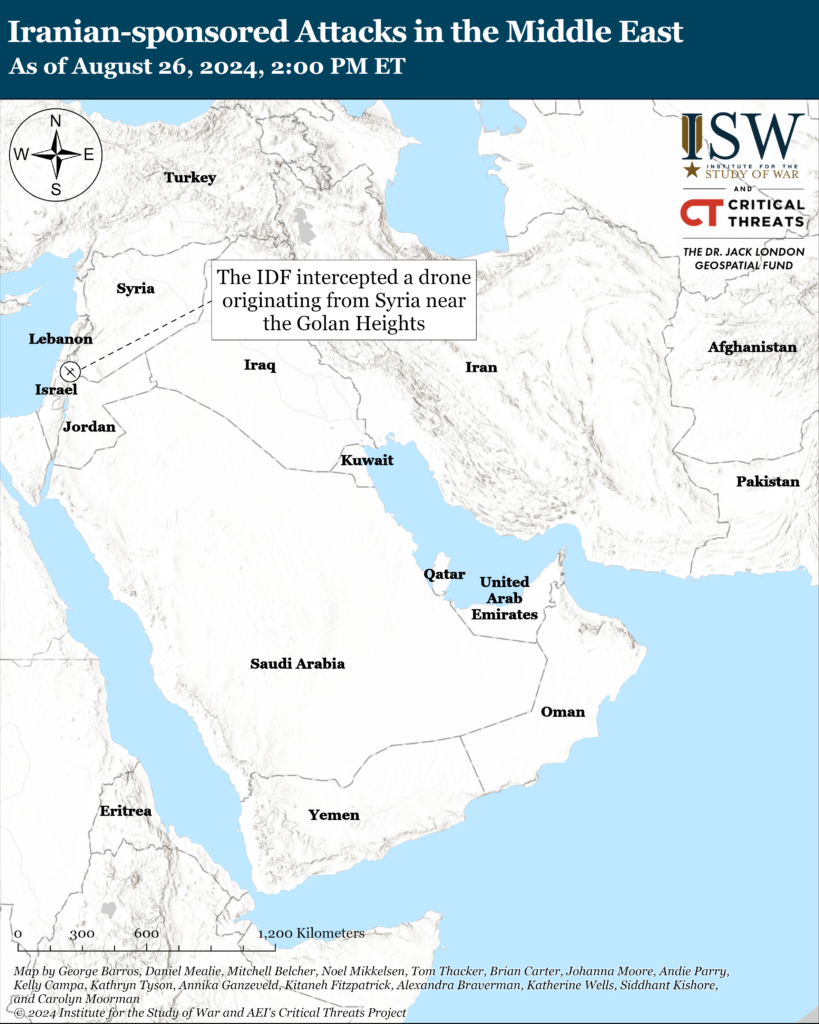
Iranian Foreign Affairs Minister Abbas Araghchi held phone calls with various foreign counterparts between August 23 and August 25. Araghchi reiterated Iran’s right to respond for Israel’s killing of Ismail Haniyeh in Tehran in separate phone calls with the Turkish, Egyptian, and Italian Foreign Affairs Ministers.[lxxxviii] Araghchi stated Iran’s support for a ceasefire to the Israel-Hamas war in separate phone calls with his Saudi and Egyptian counterparts.[lxxxix] Araghchi discussed the strategic importance of the Caucasus region in separate phone calls with the Armenian and Azerbaijani Foreign Ministers.[xc]
Azerbaijan: Araghchi discussed developments in the Caucasus region in a phone call with Azerbaijani Foreign Affairs Minister Jeyhun Bayramov on August 25.[xci] The two emphasized the need to continue to exchange high-ranking delegations.
Armenia: Araghchi discussed the important strategic role of the Caucasus region in Iranian foreign policy in a phone call with Armenian Foreign Affairs Minister Ararat Mirzoyan on August 24.[xcii]
Saudi Arabia: Araghchi discussed the ongoing ceasefire negotiations to the Israel-Hamas war and humanitarian aid to Palestinians during his phone call with Saudi Foreign Affairs Minister Faisal bin Farhan on August 24.[xciii]
Venezuela: Araghchi discussed expanding bilateral relations with Venezuelan Foreign Affairs Minister Yván Gil Pinto on August 24.[xciv] Araghchi condemned any ”foreign interference” in Venezuelan internal affairs, presumably in reference to Western condemnations of Venezuela’s fraudulent elections on July 28. The US State Department, for example, said that the processing of votes in the Venezuelan election was ”deeply flawed, yielding an announced outcome that does not represent the will of the Venezuelan people.”[xcv]
Turkey: Araghchi expressed readiness to improve bilateral relations with Turkey during his phone call with Turkish Foreign Affairs Minister Hakan Fidan on August 23.[xcvi] Araghchi emphasized that recent regional events increase the importance of coordination between Muslim countries such as Iran and Turkey.
Iranian Foreign Affairs Minister Abbas Araghchi outlined his foreign policy priorities to Iranian media on August 24.[xcvii] Araghchi said that he will first neutralize and then lift international sanctions on the Iranian economy.[xcviii] Neutralizing sanctions suggests that Iran will attempt to reduce its economic dependency on other, pro-West states, while lifting sanctions is a reference to pursuing negotiations.[xcix] Araghchi emphasized that Iran will continue its policy of ”conflict management” with the United States.[c] Araghchi explained that he intends to ease the impact of this conflict on the Iranian people, but added that Iran cannot re-implement the JCPOA agreement, and that Iran will need to conduct new negotiations.[ci] This is consistent with Araghchi’s previous statements on sanctions, as well as the supreme leader’s position.[cii]
Araghchi stated that Iran will explore opportunities with its neighbors as well as with African, Latin American, and East Asian states. He added that Iran will also work with countries that have worked with Iran despite international sanctions.[ciii] Iran will also deepen ties with emerging international powers, such as India, South Africa, Brazil, and Turkey.[civ] Araghchi explained that Iran will not be prioritizing its relationship with European states because of their hostility towards Iran.[cv] This is a continuation of former President Raisi’s neighborhood policy.[cvi] Araghchi separately stated on August 12 that he would be willing to have ”honorable, functional, and opportunity-oriented interactions” with Europe, however.[cvii]
The European Union (EU) military mission in the Red Sea reported at least five fires on the main deck of a Greek-flagged oil tanker in the Red Sea on August 26.[cviii] US State Department spokesperson Matthew Miller expressed on August 24 that the United States is concerned that the Houthis’ attacks on the Sounion could spill millions of barrels of oil into the Red Sea, causing a disaster four times the size of 1989 Exxon Valdez oil spill.[cix] The Houthis previously targeted the Greek-flagged vessel, the Sounion, on August 21.[cx] The EU’s military mission in the Red Sea, Operation Aspides, reported on August 26 that there are no obvious signs of an oil spill as of August 26.[cxi] Houthi spokesperson Yahya Sarea claimed responsibility for the attack on the Sounion and published a video of the incident on X.[cxii]
 Eurasia Press & News
Eurasia Press & News
